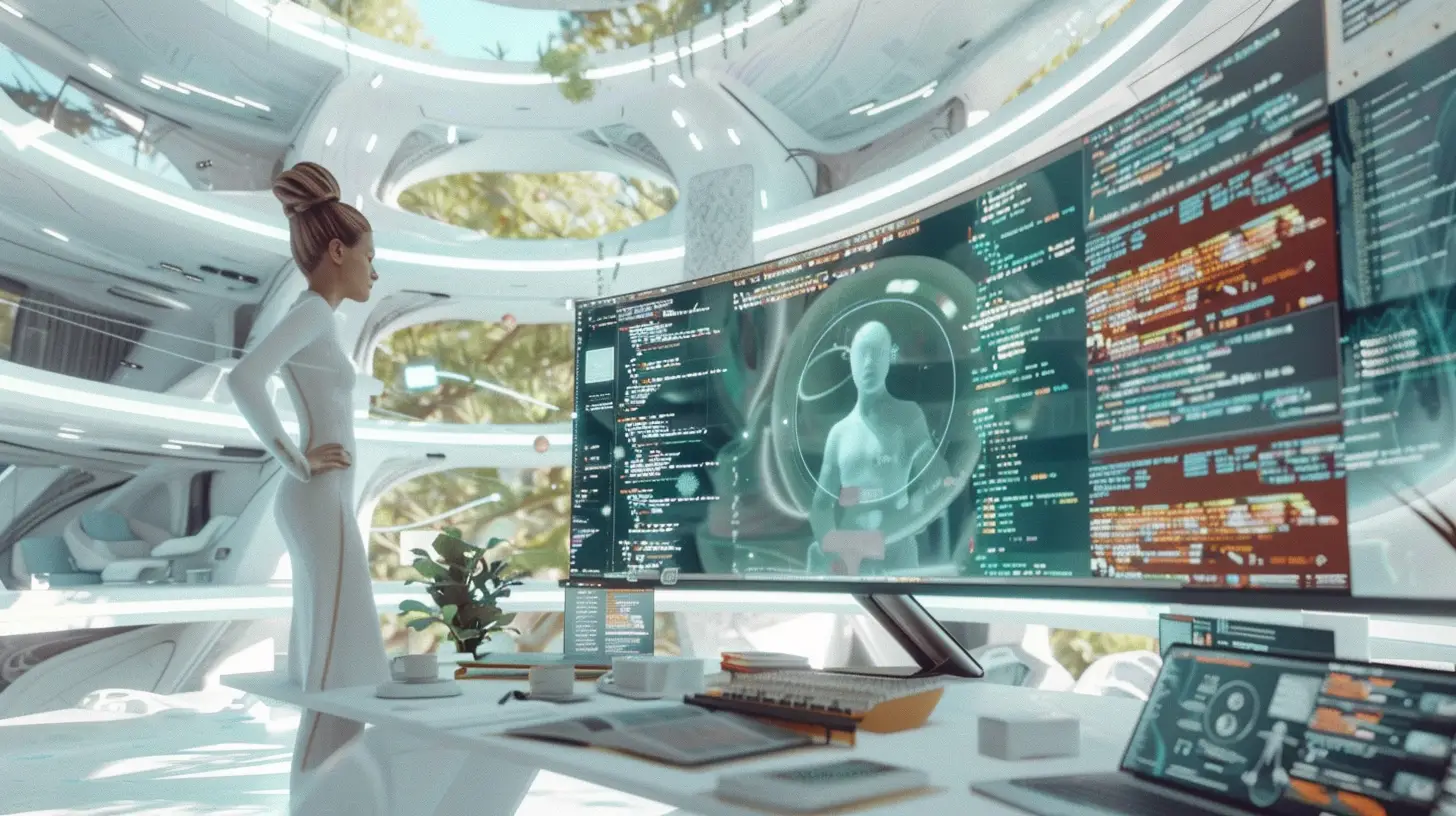Introduction
The landscape of software development is experiencing a transformation through AI code generators. These sophisticated tools are reshaping how developers approach their craft, making the coding process not just faster but fundamentally more accessible to professionals at all skill levels. As AI code generators continue to evolve, they’re creating new possibilities for both seasoned developers and those just beginning their programming journey.
This guide explores how AI code generators are changing software development, examining their capabilities, advantages, potential challenges, and the future they’re helping to shape.
What Are AI Code Generators?
AI code generators represent a breakthrough in software development technology, combining advanced machine learning algorithms with natural language processing (NLP) to transform human instructions into functional code. These intelligent tools serve as collaborative partners in the development process, helping to automate routine tasks while enabling developers to focus on more complex problem-solving challenges.
Today’s leading AI code generators include:
- GitHub Copilot – A collaboration between OpenAI and GitHub that provides context-aware code suggestions and complete function implementations based on natural language comments.
- OpenAI Codex – The powerful engine behind GitHub Copilot, capable of interpreting natural language to generate code across multiple programming languages with remarkable accuracy.
- Amazon CodeWhisperer – An AI-powered coding companion that offers real-time suggestions while seamlessly integrating with the AWS ecosystem.
- Tabnine – A sophisticated AI tool that specializes in efficient code completion through pattern recognition and contextual understanding.
- ChatGPT – While primarily known for conversation, this versatile AI tool has proven remarkably capable of generating, explaining, and optimizing code across various programming languages.
Comparison of AI Code Generators
| Feature | GitHub Copilot | OpenAI Codex | Amazon CodeWhisperer | Tabnine | ChatGPT |
| Integration | VS Code, JetBrains, Neovim | API-based | AWS IDEs | Multiple IDEs | Web, API |
| Supported Languages | | Python, JavaScript, Go, etc. | Multiple | Java, Python, JavaScript | Multiple | Multiple |
| Pricing | Subscription | API-based Pricing | Free for AWS users | Freemium | Free/Premium |
| Strengths | Code completion, intelligent suggestions | Highly flexible, natural language to code | Cloud-native, optimized for AWS users | Efficient autocompletion | Conversational, multi-purpose |
| Weaknesses | Can generate incorrect code | API access required | Limited outside AWS ecosystem | Less powerful than Copilot | Not specialized for coding |

Benefits of AI Code Generators
1. Increased Productivity
AI code generators have changed development workflows by dramatically reducing the time required for routine coding tasks. These tools serve as intelligent assistants, allowing developers to maintain their creative flow while handling repetitive implementation details. This partnership between human creativity and AI efficiency has led to higher levels of productivity in software development.
2. Enhanced Code Quality
Modern AI code generators contribute significantly to code quality by suggesting implementations that align with industry best practices. They help maintain consistent coding standards across projects while identifying potential issues before they become problems. This proactive approach to code quality helps teams deliver more reliable and maintainable software.
3. Lower Barrier to Entry
One of the most transformative aspects of AI code generators is their ability to make programming more accessible to newcomers. These tools provide real-time guidance and suggestions that help beginners understand proper syntax and structure, effectively serving as intelligent tutoring systems that adapt to individual learning patterns.
4. Automated Documentation
AI code generators excel at creating comprehensive documentation, transforming what was once a tedious task into an automated process. They can generate clear comments, detailed docstrings, and explanatory notes that make code more understandable and maintainable for entire development teams.
5. Support for Multiple Languages
Modern AI code generators extend across numerous programming languages, enabling developers to work efficiently regardless of their chosen technology stack. This multilingual capability helps teams maintain consistency across diverse projects while reducing the learning curve for new languages.
6. Accelerated Testing and Debugging
AI code generators are increasingly adept at supporting the testing and debugging process, helping to identify potential issues early in the development cycle. Their ability to suggest unit tests and debug common issues accelerates the development process while improving code reliability.
Challenges and Limitations of AI Code Generators
Despite their advantages, AI code generators have limitations. Understanding these challenges is crucial for developers considering AI-powered coding assistance.
1. Code Accuracy and Reliability
AI-generated code isn’t always accurate. It may produce incorrect or suboptimal solutions, necessitating that developers review and modify the output before integration.
2. Security Risks
AI-generated code can unintentionally create security vulnerabilities. If a model has been trained on insecure or outdated code, it might replicate those weaknesses.
3. Dependency on AI Suggestions
Relying too much on AI-generated code can impede a developer’s understanding and debugging skills, which may create gaps in knowledge.
4. Intellectual Property Concerns
There are ongoing debates regarding the ownership of AI-generated code, particularly when it is trained on open-source repositories. Some developers are concerned about possible licensing issues.
5. Limited Context Awareness
AI lacks a deep contextual understanding. Although it can generate code based on patterns, it doesn’t fully grasp project-specific requirements, which can lead to occasional inconsistencies.
Future of AI Code Generators
The future of AI in software development looks promising, with advancements expected in several key areas:
1. Better Context Understanding
Future AI models will possess enhanced contextual awareness, enabling them to produce more accurate and relevant code based on whole projects rather than just isolated snippets.
2. Stronger Security Measures
Amid rising security concerns, AI models will incorporate stronger validation techniques to identify and mitigate vulnerabilities in generated code.
3. Enhanced Collaboration Between AI and Developers
Instead of replacing developers, AI code generators will act as intelligent assistants, seamlessly integrating into workflows to boost human creativity and efficiency.
4. Greater Industry Adoption
More companies will incorporate AI-powered coding assistants into their development processes, reducing costs and boosting overall productivity.
5. Ethical and Legal Considerations
As AI-generated code becomes more common, regulatory bodies and software communities will create clearer guidelines regarding intellectual property, licensing, and ethical use.
Conclusion
AI code generators have emerged as transformative tools in modern software development, offering unprecedented opportunities for improved efficiency, quality, and accessibility. While these tools present certain challenges that require careful consideration, their benefits are reshaping how we approach software development.
The key to successfully implementing AI code generators lies in understanding both their capabilities and limitations. As these tools continue to evolve, they’re not replacing human developers but rather enhancing their abilities, enabling more innovative and efficient software development practices.
The future of AI code generators promises even more sophisticated capabilities, improved security measures, and better integration with existing development workflows. Following an AI Coding Assistant Setup Guide will help ensure these tools play an increasingly crucial role in shaping the future of software development.
What’s your experience with AI code generators? Have they transformed your development workflow? Share your thoughts and experiences in the comments below!







